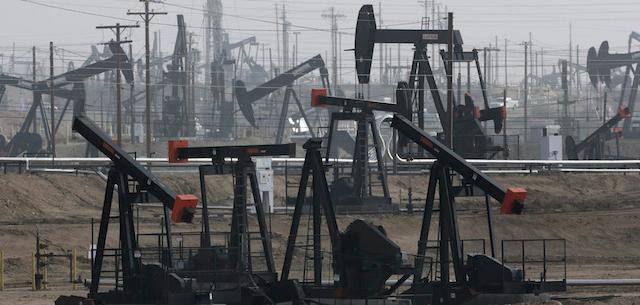If we’re talking about who’s wasting water during California’s drought, one of the big culprits is oil production — about 10 gallons of wastewater are produced for every gallon of oil. Now oil companies like Chevron are selling that water back to farmers. But it’s not as tidy of an idea as you’d think.
Newsweek reports on a practice that’s already become quite commonplace. Water extracted during oil production was likely used to help grow your oranges, grapes and almonds:
For every barrel of oil Chevron produces in its Kern River oil field, another 10 barrels of salty wastewater come up with it. So Chevron is selling about 500,000 barrels of water per day, or 21 million gallons, back to the Cawelo Water District — the local water district that delivers water to farmers within a seven-mile slice of Kern County — at an undisclosed amount, but “essentially ‘at cost,’” according to Chevron spokesman Cameron Van Ast. In a time when freshwater in the Central Valley is selling at up to 10 times the typical cost, it’s a good deal for farmers.
It sounds like the perfect feel-good corporate measure, a wastewater match made in heaven. And since Kern County is a centre for both oil production as well as agriculture, it’s all happening locally without having to transport the water very far.
But using this water is also a gamble for farmers. Groundwater is always a little saline, but during a drought it’s especially salty. During this kind of drought, it’s really salty. Farmers usually have to mix Chevron’s water with fresh water. But depending on the crop and on the farmers’ financial standing, they might not. Over time this could ruin the soil’s productivity.
Farmers test the levels of sodium and boron to make sure their fields are healthy. But there isn’t any kind of rigorous testing on the county or state level. Now a USGS team is starting a preliminary investigation to see if certain oil-producing chemicals like methanol or surfactants or other heavy metals like chromium and selenium are being passed along. While scientists don’t think these will make it into our foods, the biggest concern now is that the wastewater that’s being used to water the crops is entering the water table. In January of this year, oil companies came under fire for injecting their wastewater into federal aquifers.
Using wastewater like this is only reserved for the most dire situations; farmers only do it when there are no other alternatives, assuming that eventual rains will help flush the salt from the soil. But the problem is that no one knows how long the drought will last. If emergency measures become commonplace, farmers could end up with salty, possibly contaminated and eventually fallow fields — hurting crop production up and down the state. [Newsweek]
Picture: Jae C. Hong/AP
